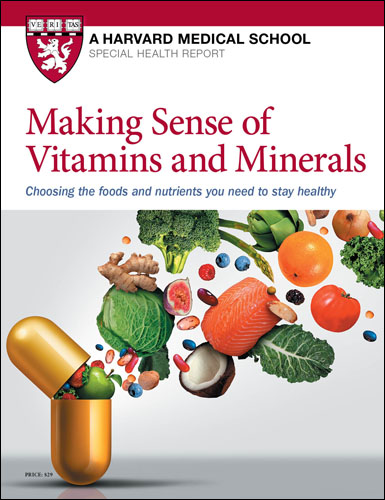The truth about nutrient deficiencies
Some women do need a boost. Find out if you're one of them.
- Reviewed by Toni Golen, MD, Editor in Chief, Harvard Women's Health Watch; Editorial Advisory Board Member, Harvard Health Publishing; Contributor

Strolling past drugstore shelves teeming with dietary supplements might make you wonder: Am I getting enough nutrients? The $35-billion-per-year supplement industry feeds this curiosity with splashy labels and claims, hoping to fuel the belief that we all need to fill a few dietary gaps.
The good news? Most supplements aren't necessary. It's also time to think bigger — as in maximizing the mix of foods on your plate.
"People tend to ask about different supplements, but we want them to focus on an overall balanced eating pattern," says Emily Blake, a registered dietitian at Harvard-affiliated Brigham and Women's Hospital. "Quick fixes are often promoted as a gateway to health, when more sustainable changes are what's going to move the needle."
Who needs a multivitamin?Big containers, bright colors, and even candy-like gummies: Who can resist the ease and appeal of multivitamins? It may feel like a nutrition insurance policy to pop a daily pill or down a specialized formula containing a combination of vitamins, minerals, and other nutrients. But if you're generally healthy and eat a varied diet, there's just no need, says Teresa Fung, an adjunct professor of nutrition at the Harvard T.H. Chan School of Public Health. "A vitamin pill does not contain all the beneficial stuff in food," Fung says. "It's not a shortcut." The following factors, however, make it more likely someone will benefit from taking multivitamins: Age. With advanced age may come trouble chewing and swallowing or a drop in desire to eat adequate meals. Pregnancy. Since many pregnancies are unplanned, women of childbearing age should consider a daily multivitamin containing the B vitamin folate, also called folic acid, which — if taken early in pregnancy — can lower the risk of brain and spinal cord defects in the developing embryo. Digestive challenges. Some conditions, such as celiac disease, ulcerative colitis, and cystic fibrosis, can interfere with normal digestion. So can gastric bypass, a weight-loss surgery that removes parts of the digestive tract. Certain medications. Proton-pump inhibitors for acid reflux and heartburn can prevent us from properly absorbing vitamin B12. Some Parkinson's disease medications also inhibit B vitamin absorption, and diuretics, taken to lower blood pressure, can deplete your stores of magnesium, potassium, and calcium. |
Ones to watch
A few of us face nutrient deficiencies unless we intentionally avoid entire food groups or otherwise drastically limit our diet, says Teresa Fung, an adjunct professor of nutrition at the Harvard T.H. Chan School of Public Health. If anything, "we're a country of excess consumption," she says. While food insecurity is a significant problem in the United States, if you are eating several meals each day, and a variety of different types of food, it is unlikely that you are deficient in calories or nutrients.
That said, women are indeed vulnerable to coming up short for a handful of vitamins and minerals due to age, hormone changes, or other factors. Here are nutrients that are most likely to be deficient.
Vitamin D. Vitamin D deficiency is especially common as we get older, since few foods are naturally rich in it. Getting enough sunlight for our skin to convert to vitamin D may be easier in the summer months, but we need to balance that benefit against skin cancer concerns. Signs of deficiency include fatigue, bone pain, mood changes, muscle aches, and weakness.
Foods high in vitamin D include fortified cow's milk and cereals, soy milk, mushrooms, canned tuna, shrimp, and salmon. Daily recommended intake is 600 IU for adults up to age 70 and 800 IU for those 71 and older; a daily 1,000-IU vitamin D supplement provides ample coverage.
Iron. Red blood cells, which carry oxygen throughout the body, rely on adequate iron stores. But pregnancy or heavy menstrual periods can take a toll, potentially leaving us lacking. So can increasingly popular plant-based diets, since animal products provide higher amounts of iron, and our bodies absorb iron more easily from animal sources.
If you're low on iron, you may feel cold, tired, or short of breath. You may have headaches more frequently. Meat and seafood typically offer plenty of iron, and plant-based sources include beans, lentils, grains, spinach, and fortified cereals. Women over 50 need 8 milligrams (mg) of iron per day; younger women, 18 mg daily.
Vitamin B12. B12 is crucial to healthy nerve signaling and red blood cell production, but we get progressively less efficient at absorbing it as we age. Vegans and vegetarians are also at higher risk of deficiency, since plants don't contain the vitamin.
Signs of a B12 shortfall include fatigue from anemia; numbness in hands, legs, and feet; or trouble with balance and walking. Memory can also suffer. Vitamin B12 is readily found in fish, chicken, milk, and yogurt. If you prefer plant-based options, try fortified nondairy milks and cereals. Adults need 2.4 micrograms of B12 each day.
Calcium. Most of us know that calcium keeps bones strong; it also helps control muscle and nerve function and regulate our heartbeat. As estrogen drops, our ability to absorb calcium diminishes, and those on vegan diets can compound the risk by avoiding dairy products.
Calcium-rich foods include cow's milk, fortified soy or almond milks, yogurt, cheese, fortified cereals, and dark green vegetables like kale and broccoli. Most adults need 1,000 mg each day, but women over 50 need 1,200 mg.
To test or not to test?
Don't count on symptoms — or their absence — to clue you in to a possible nutritional deficit. Most deficiencies are subtle, with few glaring signs, Blake says. And it's not something you can diagnose on your own.
"The term 'deficiency' is really a medical term," says Fung. "Even if you enter your diet into an app that shows its nutrient composition, it will not tell you if you have a deficiency. That requires medical testing."
Additionally, our bodies store small amounts of extra vitamins and minerals that would tide us over several weeks of poor eating, meaning our levels would have to be extremely low before a problem even shows up. A vitamin D deficiency, for instance, might only announce itself in a broken bone.
Calcium levels can't be accurately gauged from a blood test, Fung says. Typically, however, blood tests can reveal whether you're lacking in key nutrients, including vitamin D, iron, or B12. While there's "no need to test for every deficiency under the sun," Fung advises asking your doctor if she feels your risk factors warrant a closer look. "If you're concerned or even curious, it's absolutely worth a conversation with your doctor," says Blake.
Vitamin D and fish oil may prevent autoimmune diseaseMore than 24 million Americans cope with autoimmune disorders such as rheumatoid arthritis, psoriasis, or thyroid disease. But so far, scientists haven't identified potential ways to prevent these burdensome conditions, which disproportionately affect women. Now, however, a Harvard study suggests that vitamin D and fish oil supplements may offer adults over 50 protection against developing autoimmune disorders. All these conditions — which number more than 80 — occur when the immune system mistakenly attacks healthy cells, tissues, or organs. Their symptoms vary, but may include pain, fatigue, skin problems, and other chronic problems. "We were surprised that a signal for a benefit could emerge for such a broad and varied group of diseases," says Dr. JoAnn Manson, chief of the Division of Preventive Medicine at Harvard-affiliated Brigham and Women's Hospital, who led the main Vitamin D and Omega-3 Trial (VITAL) and co-authored the new report, published Jan. 26, 2022, in The BMJ. "Because there are no known ways to prevent autoimmune diseases — whether lifestyle, diet, or medications — these results were exciting." Longer use, stronger findings The randomized controlled trial — considered the gold standard of research — included 25,871 racially diverse older adults over age 50, who were split into four groups. People in one group took 2,000 IU of vitamin D3 each day; those in another took 1,000 milligrams of fish oil (containing marine-based omega-3 fatty acids); those in a third group took both; and the rest took two placebos. None knew which group they were in. The vitamin D dose used in the trial is more than twice the recommended daily intake of 600 IU (or 800 IU for people 71 and older). During a five-year follow-up period, participants told researchers whether they'd been diagnosed with any autoimmune diseases, and diagnoses were confirmed through medical records. Compared with placebo, vitamin D supplementation was associated with a 22% reduced risk of autoimmune disease over all. The improvement was greater (39%) after the first two years of treatment. Fish oil by itself showed less robust results, but still showed fewer participants with confirmed autoimmune diagnoses compared with placebo. "The results suggest that the risk reductions strengthened with longer treatment," Dr. Manson says. Inflammation-fighting effects How might vitamin D and fish oil thwart autoimmune disease? Researchers expected the duo might show preventive effects because of their ability to regulate the immune system and tamp down inflammation, which drives autoimmune disorders. The results carry important implications for women, who are at least four times as likely as men to be diagnosed with an autoimmune disorder. But it's too soon to make a public health recommendation that everyone take vitamin D or fish oil supplements in hopes of preventing autoimmune disease, Dr. Manson says. More research should also focus on the effects of these supplements in people at higher risk and in younger adults, as autoimmune conditions often develop earlier in adulthood. "But those with a strong family history, or who have been told they may have early signs of an autoimmune disorder, may want to talk with their health care providers about whether to begin taking these supplements," says Dr. Manson. |
Image: © /Getty Images
About the Author

Maureen Salamon, Executive Editor, Harvard Women's Health Watch
About the Reviewer

Toni Golen, MD, Editor in Chief, Harvard Women's Health Watch; Editorial Advisory Board Member, Harvard Health Publishing; Contributor
Disclaimer:
As a service to our readers, Harvard Health Publishing provides access to our library of archived content. Please note the date of last review or update on all articles.
No content on this site, regardless of date, should ever be used as a substitute for direct medical advice from your doctor or other qualified clinician.
















